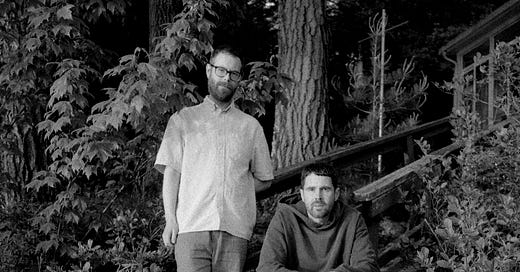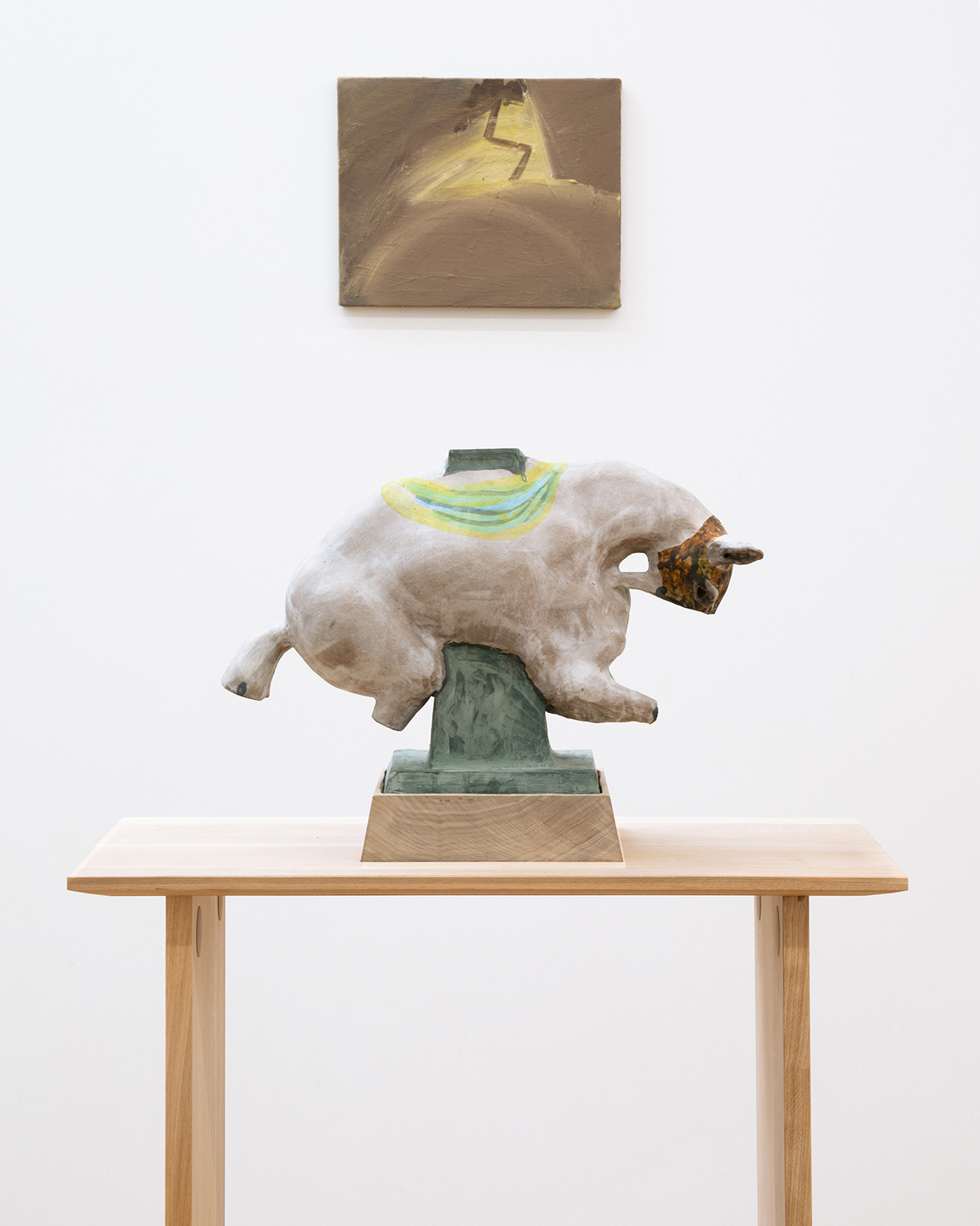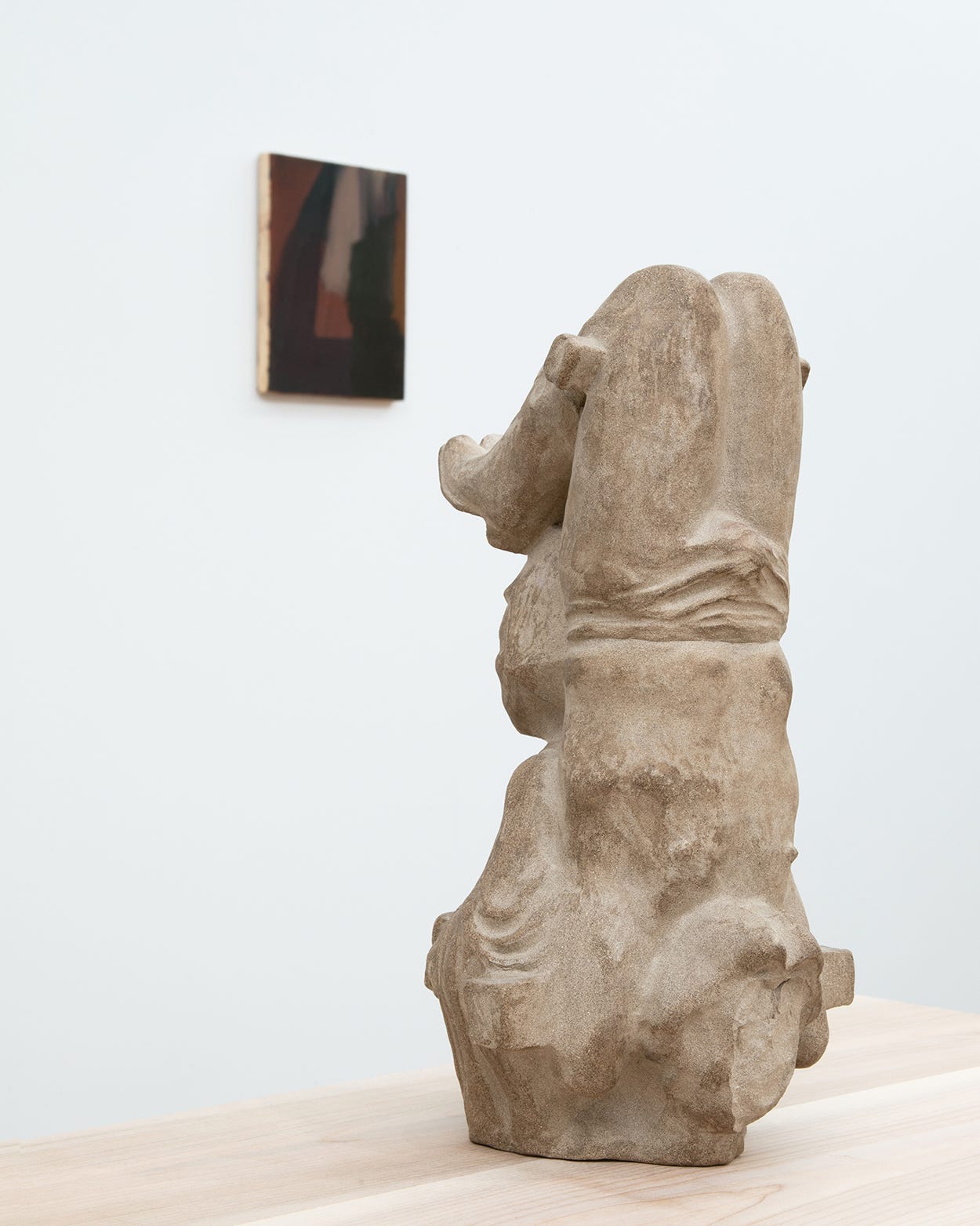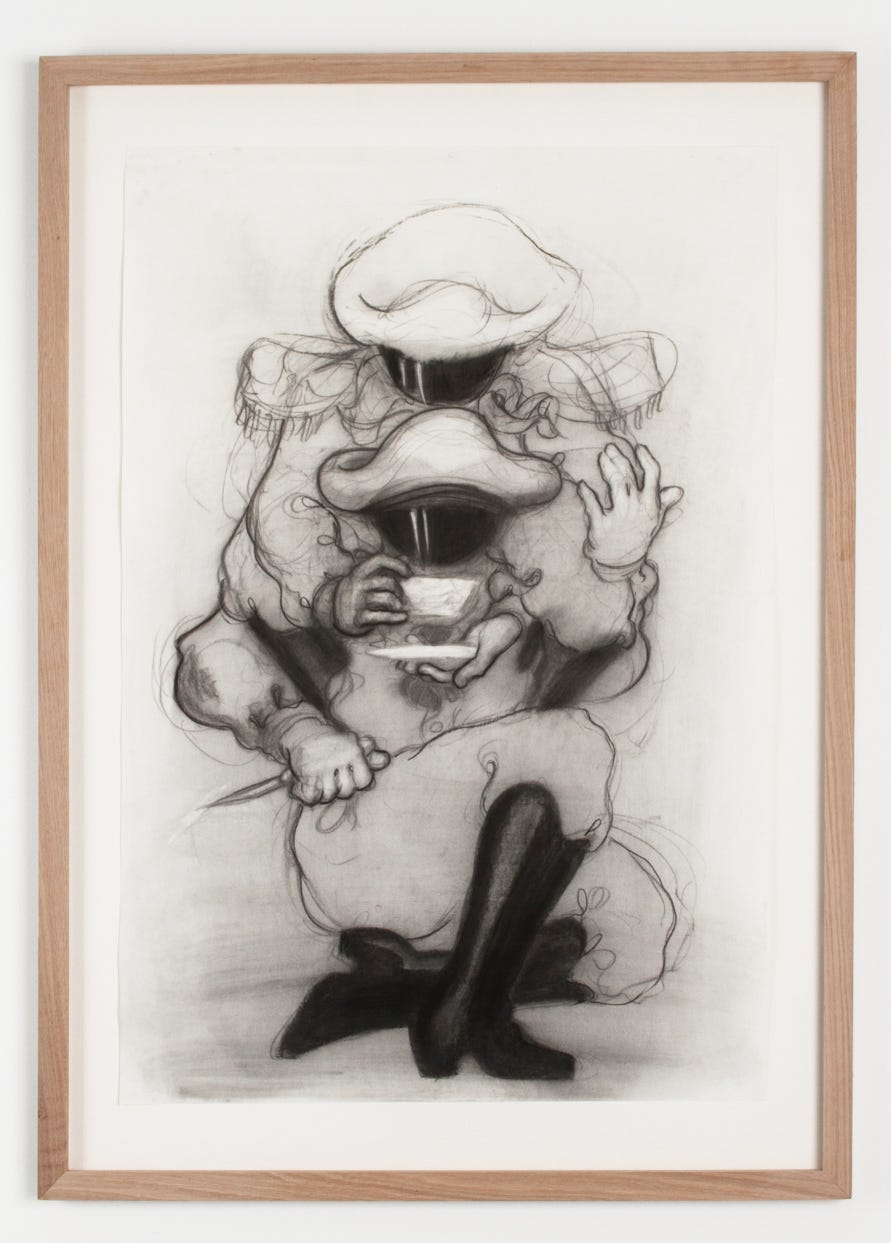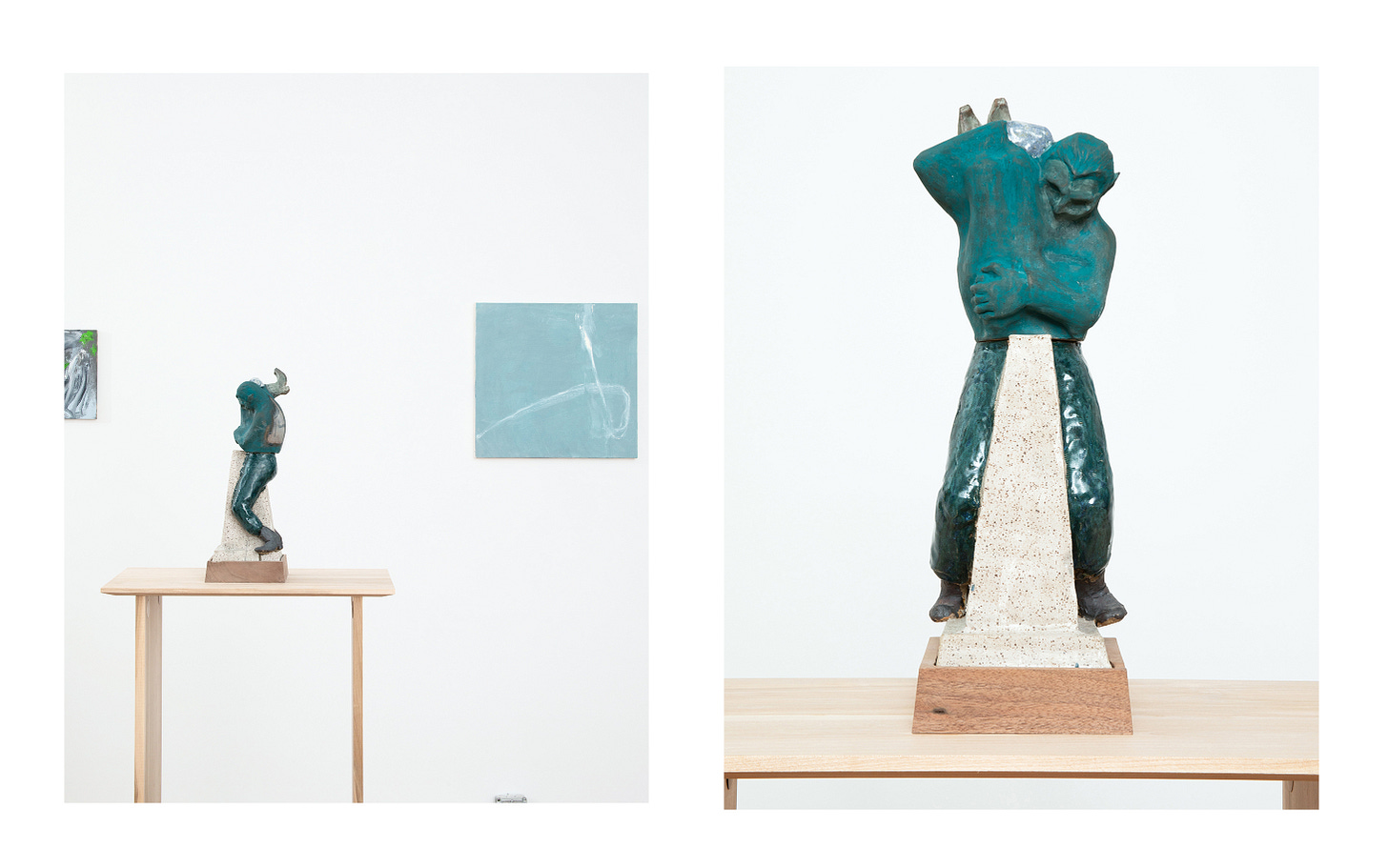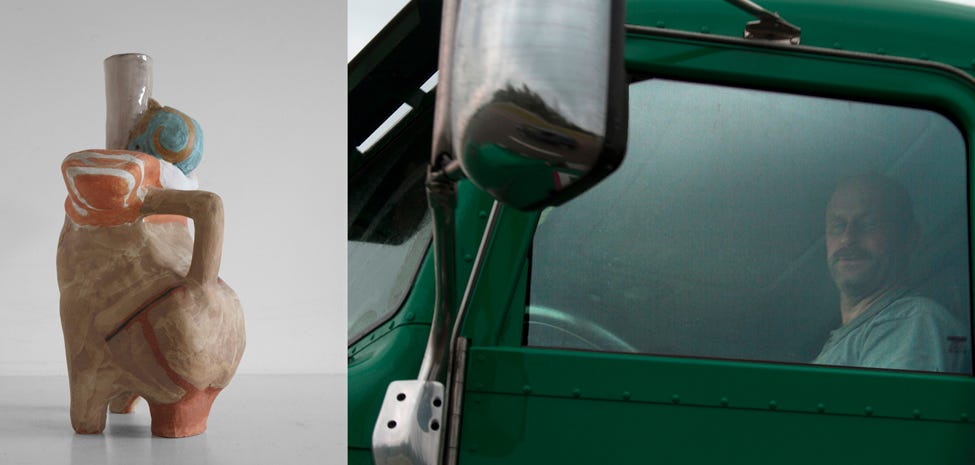Interview | Peter Shear and Jared Buckhiester
I spoke with Peter and Jared the week before they traveled to Maine for the opening of their two-person show at Dunes — A Game for the Living.
Boru (Dunes)
Peter, since you’re just closing your Cheim and Read show, maybe that’s a good jumping off point. One thing that I keep coming across when I look at your coverage is a bit of romanticism around people who are “untrained”. Especially when they’re from regional locations. It seems to be a double edged sword around an ostensible ‘democratization’, or a reduced stigma around social media as it pertains to the gatekeeping of the gallery world…but it’s a through-line I see in conversations around your work. For one, it's really satisfying to see people who are not so steeped in the narrative that is New York/ LA, but also, I'm wondering if there's a flip side of that. I’m curious if it’s… patronizing, I guess?I read in one interview that you were a custodian, which I'm assuming you're not anymore, right.
Peter Shear
I am no longer a custodian.
(laughter)
Boru
But I was curious if that's a through-line that starts to wear on you at all, with regard to conversations that you have with people?
Peter
Maybe those are conversations that have sort of grown up around the work, and almost seem like marketing talking points. An outsider who has a blue collar job, but I'm also making this sort of esoteric painting that's been adopted by the New York art world.
Boru
Do you consider it esoteric? Or more esoteric in the context of what a blue collar life looks like…
Peter
Well, of all of the jobs that I've had - being a prep cook, or as a janitor, cleaning up with guys after school at an elementary school- some of the best conversations I've had about my work have had to do with people that wouldn't normally bump into it. I think it can be as esoteric as you want. It can also be pretty concrete. The work needs to engage. If it engages people in curatorial programs and engages people that are working second shift jobs in Indiana- it's all to the good. I think it's a problem that people self-select out [of art]. Out of fear. Like it's not for them, or they don't understand it. But, the idea that there's something to understand at all is off for me. But yeah, that did wear on me. I didn't like that. But you can't really control the narrative.
Boru
So what’s the story with how you guys met?
Jared Buckhiester
We met at Oxbow. In 2011 we spent about six weeks together. Peter, you were there all six weeks, right?
Peter
No, I got there after the first couple of weeks, and felt immediately uncomfortable.
(laughter)
Everyone had that camp camaraderie- comfortable dancing and laughing and being in a group… and I just felt like I needed to hide out in my little studio. Also the normal imposter syndrome, because everyone was coming from impressive backgrounds or master's degree programs, and I had barely graduated college. I warmed up though, and people were very, very kind. I got to know you and a few other people.
Jared
I remember, we had to show our work for the group at night. Each person had a night where they had to present their work to everyone, all the other residents. Peter and I traded studio visits. I was there after my first year at Bard, where I had spent eight weeks trying to keep it a secret that I didn't know how to look at abstraction. I didn't think that I could just talk to someone about it. I felt like I needed to keep it a secret.
(laughter)
Peter
I saw through it immediately.
(laughter)
Boru
I also felt like that at Bard.
Peter
I forget you were both at Bard. That's funny. Wait, you didn't know how to look at abstraction?
(laughter)
Boru
Well I looked at it all the time...but how to talk about it.
Peter
The language around it has changed so much since I began painting. I think a lot about how certain painters were really off limits, or looked really, really dated. Someone like de Kooning. You couldn't talk about that. It was too masculine, too much hand, too emotive. Not too long after that, everyone is sort of seeing it with fresh eyes, or it's just been recontextualized.
Jared
I think it went deeper for me. I'd never had an experience where I felt like I could say, “I'm responding to something that's known in my body by looking at this abstraction”. As though I didn't even know what the purpose was. I didn't really find that until the second year in the music/sound department, it actually came through sound instead of visual abstraction.
When Peter and I traded studio visits, I read Peter’s paintings as fairly figurative, and just asked him questions about his approach. I remember what you [Peter] said about my sculpture that helped me understand how powerful a fragment could be.
Peter
I think I heard from you through Instagram at a certain point, maybe you were showing students my Instagram feed?
Jared
I taught a painting class, believe it or not. When I saw your paintings at Fortnight, I really loved them. I was also interested in the way that you titled your work so specifically.
Peter
Yeah, the titles are kind of collaged onto the paintings. There is a specificity to the image and the title, but they're kind of taken from separate areas of my brain.
Jared
It was a simple pairing in my mind. As my works become more generalized and fragmented, I just always thought it would be nice with Peter’s painting.
Boru
You feel like your work has become more generalized and fragmented?
Jared
Compared to what I used to make, yes. It’s compulsively figurative. But, for example these horses are basically cut in half. There's a whole side that's just a shape rather than anything rendered.
Boru
Yeah, even the drawings I suppose are almost a mash up and some of them where it's like you're finding hints and pieces of figuration, but not a whole. Even the one that's the most portrait looking. You're still obscuring faces.
Jared
Yeah, in the older work there may be a whole figure that's clearly rendered, I guess the shift from that to this is into a fragment of a narrative instead of a full illustration.
Boru
Yeah I was thinking about the narrative versus lack of narrative, or maybe the ruse of a narrative? The narrative is not in the individual paintings but the bigger body .
Jared you reminded me of something at Bard. relating to these ideas of narratives both in, but also around artists’ and their work. I don’t mean to draw some overwrought throughline here but- I was thinking of this relationship to fashion that seems to come up again and again when looking up your work Jared. For example this recent piece covering that Burberry collaboration you did. I have my own questions about fashion and photo, trying to navigate that minefield- especially through grad school- and I had a memory of you.
You disappeared once and I remember thinking, “I wonder where Jared is?”. No one really leaves Bard, an absence is very conspicuous. It’s expected that you're there basically 24 hours a day. Let alone weekdays. And in the middle of the week, Jared disappears. And then he mysteriously reappears 48 hours later. And we're standing around outside and I'm like, “Where did you go?” And Jared says in a hushed voice, “Oh, I just had this thing in Paris I had to go do real quick”. (laughter) And I was like, “What the fuck are you talking about?” You know? And he’s like “It was just some shoot for W magazine. And I just flew there and flew right back”. You know, jesus christ. That was the first taste that I really got of how tapped into that world you were. And not even to shoot, but to be shot, as part of Ricardo’s (Tisci) crew. You have this other part of your life. I guess I'm curious about your relationship to that. Do you feel a bifurcation? Or do you feel like, “This is my life - this is holistically who I am”?
Jared
Honestly…well…holistically who I am, absolutely not. It’s something I enjoy, like I enjoy going out dancing every six months. My connection to that world is almost entirely through two or three relationships that I developed in my 20s, when I thought that was what I wanted to do with my life. Those people are still very close friends, so I still get pulled into it. And yes, when it works out, it's really fun. But people get really confused about all the uniforms and the boots and the police hats and the gloves in my work. And I have to say that's where it shows up. There needs to be a little bit of disco and a little bit of sort of frivolous fashion happening.
But they also symbolize things like coded sexuality, vulnerability, mascing. Which is also, I guess, fashion and disco. It's funny…you're absolutely right. And I had forgotten I had done that, honestly.
I’ve lived in New York for 27 years now, and my work feels incredibly regional in a funny way. I was thinking of that difference between myself and Peter. Peter, your Instagram is so expansive. It’s different than the work itself.
Boru
Ha, interesting inversion. It's true, Peter does have an expansive voice with social media that is more curatorial and less promotional; an education on painting.
Peter
We all kind of grew up with similar media right? I was 16, 17, and then all of a sudden, there's the internet. So right around the time that I'm coming into a sense of purpose as an artist, there's a lot that I could draw on. You don't necessarily have to be a provincial artist, even if you're living in the provinces. The movies, independent films, it was a really exciting time for that. I was self-consciously a movie buff.
(laughter)
I wanted to work in a video store, that was the height of romance.
Were the movies important to you, Jared?
Jared
Oh, my God they still are.
Peter
Were they things that you watched over and over?
Jared
From an early, early age, I was really interested in horror, because that wasn't supposed to be in a fundamentalist Christian home. But I was allowed to watch Christine, the Birds, Psycho. So I'd watched those over and over again, but then there was one- Angel Heart with Mickey Rourke. My dad recorded it, but I wasn't allowed to watch it, but I would sneak it… often. Yeah, movies are very important. My dad had a pretty great interest in strange movies for someone in North Georgia.
Peter
When I was 15 years old I was really deeply into into Woody Allen. Just to give you some sort of sense of what sort of sex I wasn't having in high school.
Jared
Are we gonna talk about pleasure versus transgression.
(laughter)
Boru
That seems pertinent to your work.
Jared
I just had this really interesting conversation about this with Nancy [Shaver], with two children at the table.
(laughter)
It comes down to: does your degree of pleasure override your discomfort with the transgression.
Boru
I guess it depends on what mode of transgression we're talking about?
Jared
Depends on who you are. It's very specific to the artists and the person, the viewer, etc. There are some artists that the pleasure that I get from their art will never outweigh their transgression. Michael Jackson, Polanski.
Regarding my work, I think the strongest example for what you're talking about are the truck driver photographs. Then these sort of urinals that I make with them, as apologies for taking their picture without permission.
Boru
Can you go into that a little bit more, the apology?
Jared
I had taken these photographs on the interstate in the passenger side of a car of truck drivers through their window. With a big lens, so they would see it. I didn't know what pictures I'd gotten until I was editing them. And I would change the levels and- whoa, they're looking right into my lens, right into my eyes. Then I felt caught in something that I'm not supposed to be doing. Like I've invaded a space that I haven’t been invited into. It sort of became a game. This narrative game of making something as an apology. So I made these ceramic urinals to go with the photographs, like portable urinals for their trucks.
Boru
Ohhh wow. Ok. That’s amazing. I didn’t know if you meant that literally. I see now.
Jared
Yeah, there are these vessels that truck drivers and helicopter pilots use.
Boru
Yeah, that's great. I love those pieces.
Jared
It's also probably the most overtly sexual art that I've made.
Boru
That’s interesting. I think people really see how magical they are when they look at them from 360 degrees. For me, I look from one angle, I see one thing, I look from another angle, I see something else.
Going back to Peter’s perspective and how social media seems to have played a role. I’m curious to know a bit more about how it grew into that.
Peter
As the posts piled up, I became interested in the sequencing, the rhythms and the themes and compositions that sort of bled into each other, until it was just a daily practice, and became a bit more totalizing. Then when I would drop in my own work just letting it marinate in this historical broth.
I've lived in Bloomington for a really long time now, since 2008. I always meant to get an MFA, that's sort of what I thought you had to do. It seems in retrospect that I had some hostility towards the idea.
I had some people that I was close to at the time. I had a really heavy running dialogue with Matthew Wong. Just to feel seen by someone else and and then a few more people, and then a few more. It's really, really encouraging. But it's been slow. I feel like I've been painting for about 25 years now.
To be voted into confidence by people that you esteem, they treat you like a peer. That's fantastic. And the avenue just happened to be the internet. The problem for artists is “how do you get in front of people”? And that was an expedient way.
One of the nice things about being where I am, you’re kind of invisible. The overhead is low. You develop weird painting muscles that you wouldn't have otherwise. If I had gone to the Art Institute or Bard and then moved to Bushwick and had X amount of debt, it's almost exotic that I'm from Indiana. A lot of people just assume that I live in New York.
I mean- my life is a movie.
(laughter)
It’s an erotic thriller.
Boru
That takes place in Indiana.
Peter
Hoosier justice.
Boru
Sounds like good 90s content.

